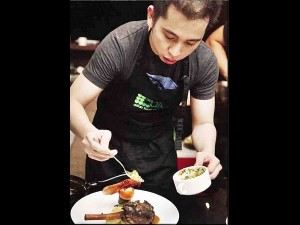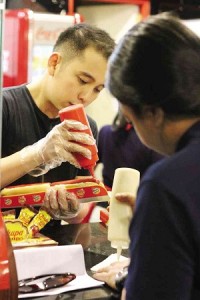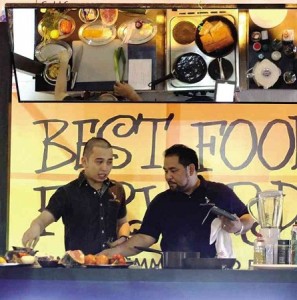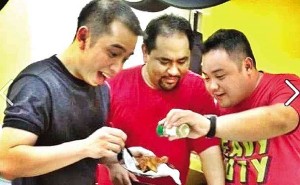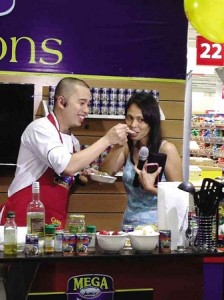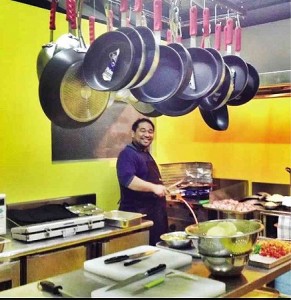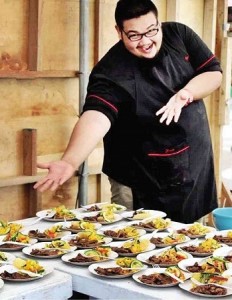Project Food to the rescue
It may seem funny, even comical, but the line “If you don’t cook, you don’t eat; if you don’t eat, you die,” made famous by comedian Jimmy Santos, was the one that inspired chef Niño Logarta to learn how to cook and fend for himself.
Living with his single parent-father Louie, a newspaperman who typically kept erratic hours, Niño learned to whip up simple dishes to feed himself after coming home from school. He would also spend the rest of his day hanging around with playmates in their Project 4 neighborhood, or watching the mothers of his friends cook, happily mingling with all sorts of people and enjoying every minute of it.
It was also a time when a degree in Culinary Arts was not that palatable to parents even as schools that offered diplomas in Culinary Arts were beginning to sprout. So for three years, Niño tried to pursue studies in Philosophy at Ateneo, only to finally decide to cross Katipunan road from Ateneo de Manila University, to the Center for Culinary Arts Manila (CCA). From then on, it was all about food for Niño.
‘’I remember the first real dinner that I prepared was a Thanksgiving dinner for my family in the US where my mom resides. My mother saw the potential in me and wanted to send me to a culinary school in Europe but things did not come together so I went to CCA,” Niño, now 34 years old, recalls.
Niño has since then become a full-fledged chef, a culinary consultant for several food companies, and a celebrity chef who has hosted a couple of cooking shows such as “Katoque,” “Quickfire,” and “Daddylicious.”
But Niño is not one to rest, literally, and rest on his laurels, figuratively. Even as he was busy with his culinary chores, his entrepreneurial spirit was being stirred to do something beyond just putting food in the oven and plating them real nicely and daintily. Project Food was thus born.
Anybody can cook but…
Project Food started in 2009 as a commissary that served the needs of Niño’s catering business. But in September 2009, Typhoon Ondoy swept away almost everything that Niño had worked for, including his catering equipment and supplies inventory.
It was only in September 2012 when Project Food was resurrected and reinvented to become the total food service company that it is now. With two partners—Jaime de las Alas and Jonah Trinidad—Niño has set up Project Food to offer everything about food—from restaurant consultancy, product research and development, staff screening and training, setting up of complete restaurant system, kitchen design, food styling and photography, private chef service, catering service and cooking demos.
“We can say that we are the only company that offers this complete range of services, from recipe development, all the way to kitchen and restaurant design,” proudly says chef Jaime de las Alas, who is also an industrial designer and interior designer by training.
Project Food caters to the needs of many entrepreneurs who dream of putting up their own food business—restaurants, coffee shops, bakeshops, etc.—but are not confident enough to make a go of it alone. Aside from the three proponents, Project Food has an extensive network of chefs and food industry workers who each has an expertise that suits the needs of clients.
“Anybody can cook but the food business is not just about the taste of the food or the concept. It is the gathering of all elements and making them work together. For instance, you cook really well but you do not know anything about the systems, marketing, inventory, food safety, or even the way the staff should be trained and handled. You definitely will not last in the business,” Jaime explains.
While entrepreneurs may come to Project Food with a concept or flagship recipes already in mind, Project Food also has a bank of restaurant concepts waiting to happen. These are products of years of research and more years of dreaming for their ideal restaurant. “We have concepts that we are willing to share with clients who do not have an idea of what kind of restaurant to open. Project Food can share these with them or we can work in partnership, there are really a lot of possibilities,” Niño adds.
Existing restaurants that need to be re-developed or reinvented, or with recipes that need to be spruced up, or with interiors that need to be redesigned or renovated, may also get all the help they need from Project Food. “Restaurants now have shorter life spans, from two to three years, and they need to come up with something new constantly to be able to attract patrons. We can help them in every aspect where they need help most,” Jaime says.
Consultancy fees vary, depending on the needs of the client, and the scale of the restaurant. For P250,000 for instance, Project Food will be able to develop recipes for a coffee shop, train its staff, advise on the interior design, and monitor its progress for months.
Project Food also does product development for clients that have raw materials that can potentially be turned into new food items.
“For instance, you have a banana plantation, we can collaborate on what new food products we can make out of the bananas. Or you have an abundance of lotus leaves in your farm, we can think of ways to use them and make a business out of it,” Niño explains.
A whole new industry
Project Food is operating in a fairly new industry that was erstwhile dominated by renowned Filipino chefs. Niño credits this boom in the food consultancy business to two things—the proliferation of local culinary schools that have produced highly competent professionals in the culinary trade, as well as the stiff competition in the restaurant business where everything has to be new, exciting, and adventurous enough to tickle the fancy and the palate of the fickle consumers.
“The state of the industry has been exciting in recent years that even Filipino chefs educated and based abroad are coming home because they have seen the big potential of the local food industry,” Niño observes.
Filipino entrepreneurs have also learned to be truly cautious of where they put their money by hiring consultants who know better and whom they can learn a lot from. They want to improve their chance of success, which is usually gauged within the first six months of a restaurant’s operation.
“For instance, not all fried chickens are the same. Why would we want to make and serve another Chickenjoy when we can study and research on new ways, new ingredients to make your fried chicken different from the rest. This is where people like us can help the entrepreneur in many ways,” avers Niño.
But young as they are, the trio behind Project Food is not bound by the rules of the industry, or their predecessors. They want to stay fresh, different, adventurous, because they know their clients will benefit from these dynamism.
“We do not necessarily abide by the boundaries set by the previous generations. They say that in the kitchen we should not wear wristwatches, or we should wear our toque, or our hair should be very, very short, but we do not want ourselves to be limited by these so-called rules. Rock and roll lang tayo, as I always say, as long as we know that the food we are putting out is delicious, safe, clean and clients are satisfied, we are happy with that,” Niño concludes.

